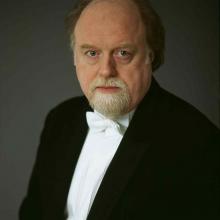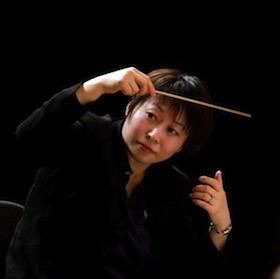St David’s Hall, Cardiff, November 12 2015
Orchestra of Welsh National Opera
Conductor: Xian Zhang
Soloist: Peter Donohoe (piano)
Rachmaninov: Vocalise
Rachmaninov: Piano Concerto No. 3
Tchaikovsky: Symphony No. 4
Enthusiasts taking in a picture of music bigger than one consisting only of its technicalities and aesthetics were early conscious of how feminism was vindicated by what they saw on the platform every time they went to a symphony concert: the lack of women musicians. Orchestras from continental Europe seemed determinedly women-free when the sociology of music was overwhelmed and obscured by its always powerful presence. British orchestras until comparatively recent times were the same, and everywhere the idea of a woman conductor was considered, among men at least and for no musical reason, unlikely when not risible. The consequence of gender bias anywhere is dreadful loss, and music history especially is the poorer for it.
Indeed, the story of women on the podium is almost entirely modern. That the leading ones today barely reach double figures is to some a sign of albeit sloth-like improvement and to others a mark of grudging acceptance. Almost all – Odaline de la Martinez, Sian Edwards, JoAnn Falletta, Jane Glover, Susanna Mälkki and Marin Alsop among them – will readily tell of the obstacles to becoming a conductor and the subsequent difficulties.
Simply mentioning all this draws attention to the gender issue, but recognising it is not as important as setting it aside when the music begins. Suffice to say, that when Xian Zhang walked on to the platform at this concert she surveyed an orchestra whose mix of men and women may or may not have reflected vestiges of male bias but which at least had a strong distaff presence, and that an all-female orchestra will still, sadly, seem a novelty where an all-male one never would be and for many decades has been considered the unremarkable norm.
Zhang, conductor and music director of the Orchestra Sinfonica di Milano Giuseppe Verdi, is popping up frequently as a guest conductor, including in the opera house. On this occasion she was both swept along and did a lot of the sweeping herself with an orchestra that can sometimes, and in the nicest possible way, be a handful when elevated from the pit. In a preview, one national newspaper described it as ‘a fine opera orchestra’, which it is, but the description was limiting, maybe unintentionally so. The suggestion seemed to be that the outcome of an opera band playing non-operatic repertory might be unpredictable. If anything, it’s the reverse. Zhang has already taken charge of WNO forces: in the company’s 2014 production of Verdi’s Nabucco, directed by Rudolf Frey.
As is so often the case when the WNO players frequently whizz upward and outward from the Wales Millennium Centre to St David’s Hall, their playing retains an operatic quality, and that can be said without any implication of self-fulfilling prophecy. By ‘operatic quality’ is meant in a general sense the readiness to engage zealously with any music of emotional extreme or grandiosity, now and again indulging in its excesses. In Rachmaninov’s Third Piano Concerto, for example, no more than a couple of times did Zhang glance over her shoulder to ensure soloist Peter Donohoe was line abreast, and there were certainly moments in the heavy-duty parts of the scoring when at least token notice might have been given that she was in control and not him or the orchestra – or him and the orchestra.

Donohoe’s imperial pianism, however, always gives the impression of being able to take care of itself. It was Zhang who was having to connect with the wavelength shared and established between soloist and band. Donohoe is strong on music’s logic, here for instance converting the opening movement’s apparently unassuming melody into the piano’s increasing domination, and attacking the climactic cadenza with both refinement and muscle. Zhang must have been relieved to have used the relatively piano-less opening parts of the middle movement to indulge its lyricism with the orchestra alone, and in the finale she was ready to allow the keyboard its variety of texture while contending with both.
By the time Tchaikovsky’s Fourth Symphony arrived, Zhang was as raring to go as the orchestra, and conducted a performance of breathtaking immediacy, emphasising the brassy call to attention at the start of the first movement as though it were straight out of Verdi; the melancholy languor of the second as the familiar lot of any number of opera characters; the third’s urgent lift-off into Tchaikovsky’s ‘capricious arabesque’, with its pass-the-parcel tunes among the strings and its woodwind flourishes; and the fourth’s orgy of eruptions and fateful reminders. It’s a heady mix, and Zhang was eager to stir it, creating a performance notable for being febrile in the right places and reflective where it most mattered. The concert opened with a Rachmaninov Vocalise in its orchestral version. It was Zhang at her most subdued and insistently interpretative, aided by first violins in sweet unison. Everything that followed was simmering or uninhibited but with Zhang taking care over subtle gradations, now and again against the odds. The WNO orchestra can be a fiery lot, eager to process matters.
Part of St David’s Hall’s International Concert Series, and part of the Cardiff-wide celebration of Rachmaninov: #CardiffRach2015
Header photo: Xian Zhang



 Enjoyed this article? Support our writers directly by buying them a coffee and clicking this link.
Enjoyed this article? Support our writers directly by buying them a coffee and clicking this link.







